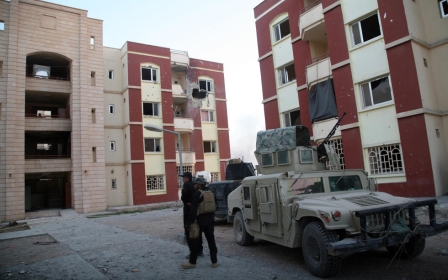Iraq forces eye swift Ramadi fightback before IS digs in

Iraq's army and allied paramilitary forces massed around Ramadi on Tuesday, looking for swift action to recapture the city from the Islamic State group before it builds up defences.
Meanwhile, US President Barack Obama weighed faster training and arms supplies for Iraqi tribes Tuesday, while eying a rapid counteroffensive to retake Ramadi.
"We are looking at how best to support local ground forces in Anbar" province, National Security Council spokesman Alistair Baskey told AFP, "including accelerating the training and equipping of local tribes and supporting an Iraqi-led operation to retake Ramadi."
With his security strategy in tatters and his authority facing its biggest challenge since he took office eight months ago, Prime Minister Haider al-Abadi was looking for quick redemption.
But the militants, whose capture of Ramadi on Sunday showed they may have been written off too soon, tried to keep up the momentum by attacking government and allied forces east of the city.
Abadi has "ordered the setting up of new defence lines in Ramadi, to reorganise and deploy the fighting troops", his office said late Monday after he held talks with Iran's visiting defence minister.
Reeling from the worst setback since IS grabbed swathes of territory in June last year, Abadi called in the Shiite-dominated Popular Mobilisation units (Hashed al-Shaabi).
He and Washington had hoped to rely on regular forces and locally recruited Sunni tribal fighters newly incorporated into the Hashed al-Shaabi.
Such a solution was seen as more palatable to the population of Anbar, a predominantly Sunni province, and a way for Washington to keep Iranian-backed militias at bay.
The Shiite paramilitary groups had been eager to join the Ramadi battle for some time and argued that Abadi's reluctance led to the provincial capital's fall.
More planning needed
Following a belated green light, they started sending convoys of fighters to Anbar, where anti-IS forces are massing, mostly east and west of Ramadi.
"The US government and Iraqi government seem to be on the same sheet of music that Ramadi has to be counterattacked before IS consolidates," Michael Knights of the Washington Institute said.
US Secretary of State John Kerry said on Monday he was "absolutely confident" that the situation could be reversed within days.
Anbar police chief Kadhim al-Fahdawi said a large number of well-prepared troops were positioned in Husaybah, about seven kilometres (less than five miles) east of Ramadi.
"This area will be the starting point for the operations to liberate the cities of Anbar," he said on Tuesday.
But much planning remains to be done before Iraqi forces attempt to move back into Ramadi, a large town on the Euphrates about 100 kilometres (60 miles) west of Baghdad.
"The military operation to liberate Ramadi and Anbar will not start until all the requirements are met," Fahdawi said.
After holding on for a year and a half during which the militants never managed to take full control of the city, Iraqi security forces pulled out of their last bases on Sunday.
The retreat was chaotic, with groups of fighters left stranded in parts of the city.
At least 28 of them were rescued in a dramatic helicopter exfiltration, footage of which has been aired on state TV, but many were killed and more are still missing.
25,000 displaced
According to an official in the Anbar governor's office, at least 500 fighters and civilians were killed in the three-day blitz that led to the fall of Ramadi.
IS released pictures of the spoils they retrieved from abandoned government bases, including tanks, armoured personnel carriers and other vehicles, as well as weapons and ammunition.
The group also released pictures of the moment when its fighters freed prisoners held at a counterterrorism detention facility.
According to the United Nations, at least 25,000 people were forced from their homes by the fighting, the second time in a month Ramadi residents had to flee.
"Nothing is more important right now than helping the people fleeing Ramadi," the UN's humanitarian coordinator, Lise Grande, said in a statement.
"Thousands of people had to sleep in the open because they didn't have places to stay," she said.
At least 2.8 million people have been displaced by conflict in Iraq since the start of 2014.
Four times as many people have been forced from their homes in neighbouring Syria, where IS was also trying to retake the initiative and made gains in the Palmyra area.
Stay informed with MEE's newsletters
Sign up to get the latest alerts, insights and analysis, starting with Turkey Unpacked
Middle East Eye delivers independent and unrivalled coverage and analysis of the Middle East, North Africa and beyond. To learn more about republishing this content and the associated fees, please fill out this form. More about MEE can be found here.




